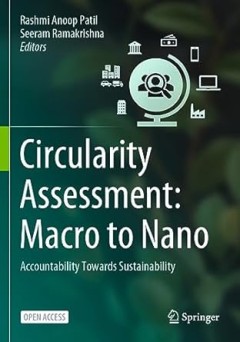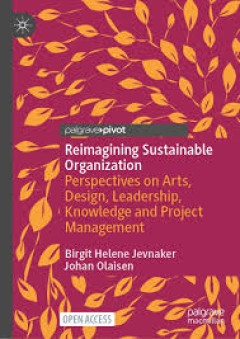Filter by

Enabling Sustainable Energy Transitions : Practices of legitimation and accou…
This open access book reframes sustainable energy transitions as being a matter of resolving accountability crises. It demonstrates how the empirical study of several practices of legitimation can analytically deconstruct energy transitions, and presents a typology of these practices to help determine whether energy transitions contribute to sustainability. The real-world challenge of climate …
- Edition
- 1
- ISBN/ISSN
- 9783030268916
- Collation
- XXI, 168hlm; ill., lamp.,
- Series Title
- -
- Call Number
- -

A Companion to the Renaissance in Southern Italy (1350–1600)
A Companion to the Renaissance in Southern Italy offers readers unfamiliar with Southern Italy an introduction to different aspects of the fifteenth- and sixteenth-century history and culture of this vast and significant area of Europe, situated at the center of the Mediterranean. Commonly regarded as a backward, rural region untouched by the Italian Renaissance, the essays in this volume paint…
- Edition
- Volume: 19
- ISBN/ISSN
- 9789004526372
- Collation
- -
- Series Title
- -
- Call Number
- -

Manual of Digital Earth
This open access book offers a summary of the development of Digital Earth over the past twenty years. By reviewing the initial vision of Digital Earth, the evolution of that vision, the relevant key technologies, and the role of Digital Earth in helping people respond to global challenges, this publication reveals how and why Digital Earth is becoming vital for acquiring, processing, analysing…
- Edition
- 1
- ISBN/ISSN
- 9789813299153
- Collation
- XIX, 852 hlm; ill., lamp.,
- Series Title
- -
- Call Number
- -

Circularity Assessment: Macro to Nano
This open access book attempts to provide a perspective on the circularity assessment at different levels of the systemic hierarchy and advocates better resource management for a sustainable future. It demonstrates how relevant circularity indicators are used for quantifying the extent of circularity of each level. Illustrative case studies that discuss the process of quantitatively interpretin…
- Edition
- 1
- ISBN/ISSN
- 978-981-19-9700-6
- Collation
- XXIX, 115
- Series Title
- -
- Call Number
- -

Reimagining Sustainable Organization
How can we learn to lead and think greener, smarter, and healthier in our daily work? This chapter considers the rise of visions and goals towards more sustainable organization for both business and society. The landmarks of tomorrow seem to be broadly affected by management ideas on sustainability—whether by deep or shallow thinking. What can various sustainability orientations mea…
- Edition
- -
- ISBN/ISSN
- 9783030962104
- Collation
- XV, 188
- Series Title
- -
- Call Number
- -

Green Recovery with Resilience and High Quality Development
- Edition
- 1
- ISBN/ISSN
- 978-981-19-9470-8
- Collation
- XXXIII, 625
- Series Title
- -
- Call Number
- -
- Edition
- 1
- ISBN/ISSN
- 978-981-19-9470-8
- Collation
- XXXIII, 625
- Series Title
- -
- Call Number
- -

Multivariate Statistical Analysis in the Real and Complex Domains
Multivariate statistical analysis often proves to be a challenging subject for students. The difficulty arises in part from the reliance on several types of symbols such as subscripts, superscripts, bars, tildes, bold-face characters, lower- and uppercase Roman and Greek letters, and so on. However, resorting to such notations is necessary in order to refer to the various quantities involve…
- Edition
- -
- ISBN/ISSN
- 9783030958640
- Collation
- XXVII, 921
- Series Title
- -
- Call Number
- -

Management of Hydropower Enterprises: Intelligent Operation, Exploration and …
Buku akses terbuka ini menyoroti potensi tenaga air di daerah aliran Sungai Dadu di provinsi Sichuan, Tiongkok Barat Daya, dan bagian penting dari sistem pengendalian banjir untuk Sungai Changjiang (Yangtze). Memastikan pengoperasian stasiun tenaga air yang aman, ilmiah, dan ekonomis merupakan dasar untuk pembangunan berkelanjutan bagi perusahaan tenaga air dan merupakan tugas terpenting selama…
- Edition
- 1
- ISBN/ISSN
- 978-981-97-5584-4
- Collation
- 1 online resource ( XIX, 180 Pages)
- Series Title
- Water Resources Development and Management
- Call Number
- 621.213 YAN m

Society - Water - Technology: a Critical Appraisal of Major Water Engineering…
Buku ini menyajikan hasil Kelompok Riset Interdisipliner "Masyarakat – Air – Teknologi" dari Akademi Ilmu Pengetahuan dan Humaniora Berlin-Brandenburg. Buku ini menguraikan kriteria evaluasi interdisipliner untuk proyek-proyek rekayasa air utama (MWEP) dan menggambarkan penerapannya di Lembah Yordan Hilir (Timur Tengah) dan Lembah Fergana (Asia Tengah). Kedua wilayah tersebut dicirikan oleh…
- Edition
- 1
- ISBN/ISSN
- 978-3-319-18971-0
- Collation
- -
- Series Title
- Water Resources Development and Management
- Call Number
- 627.1 HUT s

Sustainable Land Use and Rural Development in Southeast Asia: Innovations and…
This book is based on the findings of a long-term (2000-2014) interdisciplinary research project of the University of Hohenheim in collaboration with several universities in Thailand and Vietnam. Titled Sustainable Land Use and Rural Development in Mountainous Areas in Southeast Asia, or the Uplands Program, the project aims to contribute through agricultural research to the conservation of nat…
- Edition
- -
- ISBN/ISSN
- 978-3-642-33377-4
- Collation
- X, 490
- Series Title
- Springer Environmental Science and Engineering (SPRINGERENVIRON)
- Call Number
- -
 Computer Science, Information & General Works
Computer Science, Information & General Works  Philosophy & Psychology
Philosophy & Psychology  Religion
Religion  Social Sciences
Social Sciences  Language
Language  Pure Science
Pure Science  Applied Sciences
Applied Sciences  Art & Recreation
Art & Recreation  Literature
Literature  History & Geography
History & Geography